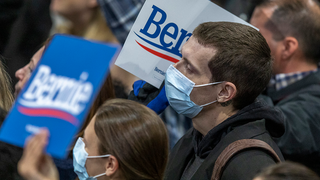Five primary elections in five US states were delayed due to the COVID-19 pandemic this week. The governors of Georgia, Kentucky, Louisiana, Maryland, and Ohio postponed upcoming elections to determine the Democratic candidate for the presidential election against President Trump in November.
The mass congregation of voters is hard to align with the principles of social distancing needed to fight COVID-19.
So what are the candidates doing about it?
Both primary candidates for the Democratic nomination, Vermont senator Bernie Sanders and former vice-president Joe Biden, have greatly reduced their public engagements in the face of the epidemic. The election campaigns, however, must continue - the Democratic Party needs to determine a nominee by July to face off against the incumbent president in November. The candidates are currently holding virtual campaign events. The move to postpone primary elections to May, June, July, or a yet-to-be-determined date is simply not practical, especially given the potential need for social distancing to last six months.
What sort of impact will this have on voting?
In the United States - unlike Australia with its robust electoral system and strong state and federal electoral commissions - voting is not compulsory, and turnout is low. Since 1980, less than 20 per cent of eligible registered Democrats voted in primary elections, with a high of 19.5 per cent in 2008. Changing election dates may confuse voters and deter those who would otherwise vote from turning out. In a country where so many are unable to vote or face great hardships to vote - such as four-hour-plus waits - due to gerrymandering and other attempts to decrease voting rights, this could be problematic for the health of the American democracy.
Encouraging voters to line up for hours could be disastrous for any infection mitigation efforts.
Is this breaking the democratic process?
The move to postpone primary elections is not necessarily undemocratic. While postponement is not ideal, primary election dates are arbitrary. Unlike the general election in November, there is no existing legal or constitutional precedent enforcing specific dates for primary elections. Caucuses are organized by state-level Democratic or Republican Party groups, and the dates are not set by legislatures. Caucuses differ from primaries, but the idea of a mass congregation of people remains the same.
The current order, which started with the Iowa caucus, the New Hampshire primary, the Nevada primary, and then the Super Tuesday states and so on, exists due to convention. Moreover, encouraging voters to line up for hours could be disastrous for any infection mitigation efforts.
Put a stamp on it
In the 2020 election, the ideal solution is for states to greatly increase the capacity to accept mail-in ballots. There is existing infrastructure for postal ballots that would need to be bolstered. While increasing the availability of absentee ballots will pose some level of burden on election workers, it is a necessary accommodation during this trying public health emergency.
Increasing absentee ballot capacity is a preventative measure for election officials as well - many of whom deal with hundreds of voters throughout one day and regularly touch dirty voting machines, pens, and paper.
According to the 2016 edition of the Election Administration and Voting Survey, of the 14 states that returned information on election official's ages, 11 states said more than half of their election officials were aged 60 or older. This age bracket is particularly vulnerable to the effects of COVID-19.
The date of the general election is enshrined in federal law, which stipulates that the presidential election must be held on the first Tuesday of November.
While it is expected that society will need to deal with reconvening in large numbers, as well as potentially touching dirty surfaces in order to function once the epidemic curve has flattened, it is not clear that this will be possible by the November election.
Trump will still face an election in November
The move to postpone primary elections does not increase the likelihood of potential postponement of the November presidential election against the Democratic nominee and the incumbent President Trump.
The date of the general election is enshrined in federal law, which stipulates that the presidential election must be held on the first Tuesday of November.
But, as with the primary elections, provisions must be put into place now to ensure people can vote if the pandemic is still ongoing by the end of the year.
Fortunately, there is still time for Congress to pass a bill encouraging absentee voting in November, and for individual states to delay their primary election votes and prioritise mail-in ballots.






